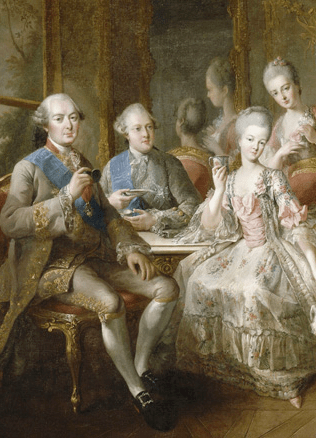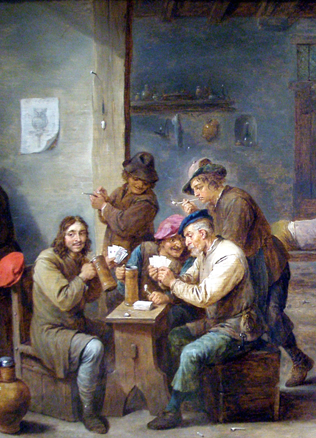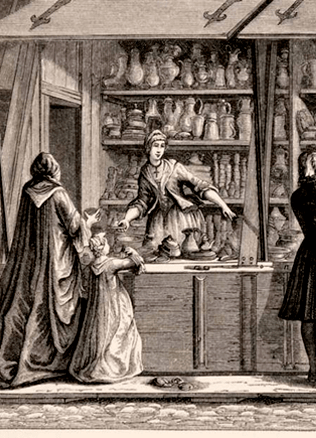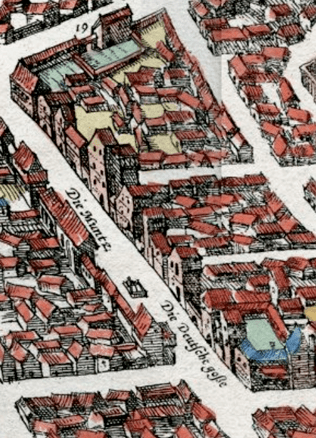How the Ruler granted his domain
In the 16th century many irritated and angry noblemen started creating stories about themselves. Wealthy and influential noblemen told them through the lips of the writers who glorified their ancestors and their deeds, spread information about their noble descent and majestic present. Lesser noblemen contented themselves with more modest forms of literature. Most often small stories were told in the court rooms when the nobleman started to defend his honour and dignity by stating that his father’s father received twenty people from his Highness Duke Vytautas…” We think that Grand Duke of Lithuania Vytautas was the first to start applying systematically political practice of granting peasants to his subordinates. Such peasants referred to as veldamai were the expression of the Ruler’s favour.
The Ruler’s generosity for the nobility’s favour
The internal war that started after Vytautas’ death (1430) speeded up this practice. Most probably in this way it was easier to get the nobility’s favours, which was necessary to the claimant to the throne of the Grand Duke. In the Lithuanian society, which found this tradition very important, the said practice turned into a certain form of coexistence with the nobility was common to the Ruler.
Do You Know?
This practice reached its culmination during the years of the reign of Lithuanian Grand Duke and King of Poland Casimir. Historians counted that Casimir entered approximately thirty acts of giving gifts per year into his books of metrics (between 1440 and 1480, there were about 1 200 cases of giving gifts recorded).
In the 16th century the pace somewhat slowed down.
This way of acquiring immovable property was well-known to society. There were even falsifications.
The Ruler was the only person in the whole state who had the right to grant immovable property.
It was complicated to appeal to the Ruler about this matter. Perhaps the problem was not big if one served in the Ruler’s court. However, a small or average nobleman, for example, who lived in Mstislaw had to think twice before his trip. It was simple to appeal to closer influential people and, through their intercession, receive immovable property.
The influential people could intercede in different ways. Most often it was sufficed to give immovable property in the estates that one administrated. Then the nobleman went to the capital with a received official letter, which was approved by the Ruler. This procedure was simpler for the Ruler too – there was no need to send his own people to check whether the land granted was really vacant and belonged to nobody, whether it was given lawfully, whether no harm was done to the treasury. Checking was the responsibility of the intercessor. Of course, the nobleman could utter a word in favour of the boyar at the Sejm where the latter arrived with the request. The Sejm, however, did not have sittings every day. The intercessor sometimes could make a request himself.
But the Ruler’s favour was an expensive political and economic resource.
Division of the estates: he who asks – receives
It was more complicated to get land from the Ruler without the intercessor’s help. The possibility depended on the social status of the receiver. The great nobles and servants of the Ruler’s court found it easiest to approach the Ruler. They were granted estates for “long and faithful service”, at least this is what had been recorded. Only sometimes more original wordings let us suppose that perhaps there was a real reason for receiving such gifts: “Hence, we, with agreement and intercession of Vilnius Voivode, seeing good deeds and military service to the Grand Duchy of Lithuania done by Sworozinski, and rewarding him for all that, give those mentioned villages […] with people living there, ploughed fields and lands, inhabited and vacant, with all taxes, income and yields belonging to these villages, to him and write down thereby this official letter …”
Let us not think that the acquisition of immovable property was a matter of cupidity. That could have been a reward for the services rendered, help in case of trouble or the expression of climbing the ladder. In some cases that could have been at the very least logical: if one has to go to see the Ruler to ask him for approval of the land that the late father had owned, why not take the opportunity and ask the Ruler for a favour to allow him to manage a vacant plot of land that was next to it?
Let us go back to keeping the land “until the ruler’s will and favour”. Everything was well, as long as the benefactor did not meet with a failure or a success. Troubles began both in case of the death of the individual in whose name the expensive privilege had been granted, and in case of a leap in his career from the state’s periphery to a more important position. To avoid the “new authorities” demanding that the estates that belonged to the lands of the castle should not be given back, it was necessary to cover a long way and ask the Ruler to approve the lands that one had, and that time “for good.”
The Ruler’s “inexhaustible” lands
Why did it so happen that the Ruler who constantly granted his domain never ran out of it? Several factors prevented the Ruler’s domain from becoming smaller. The most important factor was the internal colonisation of the country. With the population increasing ever new areas of a scarcely populated country were farmed. With the number of people growing, the Ruler encouraged this process by granting tax reliefs to those who farmed the land anew. In this way the Ruler could dispose of an ever-larger area of land.
Another thing was that not all the lands granted remained in the hands of the people who received them. If the individual who was granted land buy the Ruler was childless, upon his death the estates went back into the hand of the Ruler again. True, not for a long time – it is likely that the same land soon was granted to another individual. In this way part of the Ruler’s lands constantly changed hands without doing any additional harm to the Ruler’s treasury.
Of course, the Ruler took care of his estates. The documents of the Office in which gifts given were recorded contain sentences showing concern about the “greater (or smaller) harm done to our Treasury”. At the beginning of the 16th century Bona Sforza, Sigismund’s the Old wife, took especially great care of her estates. The campaign of taking back her estates, though put her in disfavour with the Lithuanian society, was a clear sign showing a great concern of the ruling circles about their own incomes and incomes of the Treasury of the State. The volok reform that was carried out later involved not only the domain of the Queen but also all the lands of the Ruler.
Naglis Navakas



